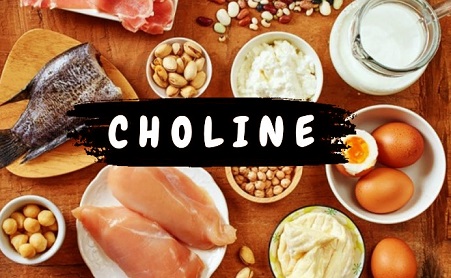New Study Highlights Choline’s Role in Supporting Cognitive Health in Older Adults
Nikhil Prasad Fact checked by:Thailand Medical News Team Oct 31, 2024 5 months, 1 week, 6 days, 8 hours, 30 minutes ago
Medical News: Researchers Reveal Key Findings from China Health and Nutrition Survey
A new study from the National Institute for Nutrition and Health at the Chinese Center for Disease Control and Prevention (China CDC) highlights how dietary choline intake can play a significant role in cognitive health for adults over 55. With China’s population aging at a rapid pace, cognitive decline has become a growing concern, affecting the quality of life for millions. Researchers, led by Fangxu Guan and Huijun Wang, analyzed data from over 7,600 older adults who participated in the China Health and Nutrition Survey (CHNS) between 1997 and 2018. This
Medical News report explores the key findings and potential implications for older adults, particularly those in China.
 New Study Highlights Choline’s Role in Supporting Cognitive Health in Older Adults
Study Details and Population Overview
New Study Highlights Choline’s Role in Supporting Cognitive Health in Older Adults
Study Details and Population Overview
The researchers focused on a subset of participants from the CHNS survey, all aged over 55, and assessed their dietary intake of total choline and L-alpha-glycerylphosphorylcholine (GPC), a specific form of choline. Using a global cognition score to evaluate cognitive health, the team observed participants over an average follow-up period of 6.8 years. The average daily choline intake among participants was 178.8 mg, with GPC intake averaging 16.3 mg per day. Findings reveal that increased choline consumption is strongly associated with improved cognitive function scores, particularly in certain age groups and genders.
Choline Intake Linked to Better Cognitive Performance
One of the primary revelations was that individuals with a higher intake of choline demonstrated better cognitive performance over time. Those who consumed more than 205 mg of choline per day were more likely to achieve higher scores on cognitive tests, which included memory, verbal fluency, and executive function assessments. Importantly, this correlation was particularly evident in women and individuals aged 55 to 65, who appeared to benefit the most from increased choline intake. In contrast, while men also experienced cognitive improvements, their results were notably influenced by higher GPC intake.
Gender Differences in Choline and GPC Intake Effects
Further analyses showed that while both men and women benefit from increased choline consumption, the type of choline matters. For women, total choline intake had a more pronounced effect on cognitive health, with a high intake correlating to better overall cognitive scores. Men, on the other hand, exhibited a stronger response to GPC intake, suggesting potential gender-specific mechanisms in how the body processes and utilizes choline forms. According to the study, women consuming higher levels of choline showed an 8.3% improvement in cognitive scores, while men with elevated GPC intake reported a 7.3% cognitive boost.
Choline’s Potential to Delay Cognitive Decline in Older Adults
The research highlights that higher choline intake not only improves cognitive s
cores but also acts as a protective factor against cognitive decline, especially in individuals aged below 65. Participants with a daily choline intake above 205 mg were 23.8% less likely to experience cognitive impairment, with women showing even greater protection. The researchers explain that choline acts as a precursor to acetylcholine, a neurotransmitter critical for memory and learning, which likely accounts for the cognitive benefits observed.
For individuals with a low choline intake, cognitive decline was more prevalent, emphasizing the need for adequate dietary choline. The study also underscores the impact of choline on brain health, particularly in those with limited access to high-choline foods such as eggs, meat, fish, and dairy, as well as soy-based foods commonly consumed in China.
Dietary Recommendations and the Importance of Early Supplementation
Despite the positive findings, the study indicates that the average daily choline intake among the participants fell below recommended levels. The Dietary Reference Intakes for China suggest a daily choline intake of 500 mg for men and 400 mg for women. The observed average, at around 191 mg for men and 167 mg for women, suggests that dietary habits may need to be adjusted to meet these guidelines.
To bridge this gap, researchers recommend increasing the intake of foods rich in choline, such as eggs, lean meats, fish, and legumes, along with other micronutrients essential for cognitive health. The study’s authors also point out that increasing choline intake earlier in life could offer preventative benefits, potentially delaying or reducing the risk of age-related cognitive decline.
Implications for Public Health and Future Research
The study's findings suggest a need to raise awareness about the benefits of choline, particularly as part of a balanced diet in older adults. With China home to the world’s largest population of seniors, promoting choline intake could have widespread positive effects on national health. Moreover, choline’s impact on cognitive health could reduce the societal and economic burdens associated with cognitive impairment and dementia. Given these implications, the authors call for further research to explore choline’s role in cognitive health across different populations and to develop more targeted dietary recommendations.
Study Conclusions
The research led by the National Institute for Nutrition and Health and the China CDC demonstrates that higher dietary intake of total choline and GPC is beneficial for cognitive function among older adults. The study found that increased choline intake was particularly effective in maintaining cognitive health in women and adults aged 55 to 65, with GPC intake showing specific benefits for men. The findings emphasize the importance of choline as a nutrient for cognitive health, advocating for greater dietary awareness and public health measures to encourage adequate choline consumption among older adults in China and beyond.
The study findings were published in the peer-reviewed journal: Nutrients.
https://www.mdpi.com/2072-6643/16/21/3713
For the latest on Cognitive Health, keep on logging to Thailand
Medical News.
Read Also:
https://www.thailandmedical.news/news/key-genes-behind-diabetes-linked-cognitive-decline-uncovered
https://www.thailandmedical.news/news/unlocking-the-secrets-of-brain-drug-delivery-insights-from-choline-and-flvcr2
https://www.thailandmedical.news/news/pregnancy-and-covid-19-study-shows-choline-supplements-could-help-pregnant-women-reduce-negative-effects-of-covid-19-in-newborns
